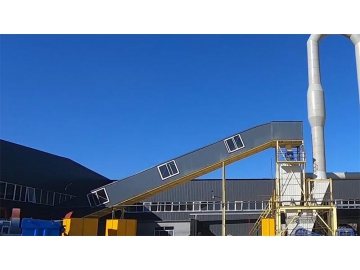Grinding and Milling Unit
Synthetic gypsum features defects of small specific surface area and unreasonable grain composition due to its forming mechanism.
Specific defects: Synthetic gypsum features 40~60% of specific surface area of natural gypsum, relatively average particle size, far less than grinded natural gypsum grain composition;
Therefore, making plasterboard using synthetic gypsum with water added directly is not an option, because dry powder’s flowing, conveying and feeding performances are hard to be controlled; on the other hand, due to segregation and delamination, strength and bulk density of the board are not even, which would result in problems in bonding of core and facing paper.
Therefore, a grinding and milling process is applied in synthetic gypsum processing after calcination, to increase grain composition and particle size of synthetic gypsum, to deal with the problems above.
Change specific surface area and grain composition properties of calcined synthetic gypsum by grinding and milling.
Cooling devices should be placed in special areas.
